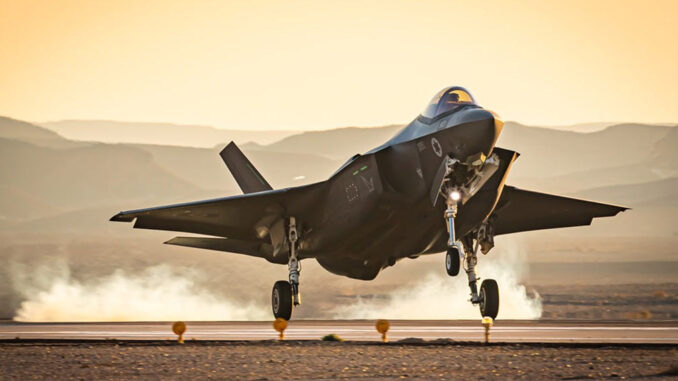
Israel Defense Forces / Wikimedia
Israel’s air superiority over the Middle East can be attributed to its unique F-35I Adir stealth fighter jet – the only nation on Earth with a custom version of the Lockheed Martin F-35 Joint Strike Fighter.
The origin story of the “Mighty One” begins in 2010, when Israel became the first country outside the aircraft’s nine-nation co-development group to buy the jet. By 2018, Israel became the first country to debut its version of the F-35 as combat operational. The Jewish state’s fleet of fifth-generation stealth jets has been an instrumental tool in its shadow war against the Islamic Republic of Iran and overall deterrence in the region.
While the American F-35 Lightning II is arguably the most advanced fighter jet in rotation, Israel acquired them with their own unique specifications. In the last decade, custom variants of fourth-generation jets to client states have become a typical practice. For instance, the Su-30MKI is India’s version of the Su-30, and the CF-18 Hornet is Canada’s version of the F-18 Hornet. However, Lockheed-Martin has refused to undergo major client state-specific modifications to the F-35. Israel was able to maneuver around this barrier and involve its local defense contractors in acquiring the jets. This deal allowed sophisticated helmet sets and wings to be manufactured in Israel by its own defense industry, paid for with U.S. military aid.
F-35I -A Special Stealth Fighter
The F-35I variant can be externally modified by the Israeli Air Force (IAF), which also has access to the jet’s advanced digital architecture, including its communication systems, electronic warfare and surveillance suite, and mission control hardware. Included in the “Mighty One’s” Israeli-made hardware is an electronic warfare system that has a “plug-and-play” function for add-on systems like air-to-air missiles and external electronic warfare pods.
Additionally, extending the F-35I’s range has remained a top priority for Israel. Due to distance, Israel’s ability to carry out an airstrike inside Iran while ensuring enough fuel remains for the return trip has been a significant issue. As a result of this challenge, Israel has been the first country to ask for external fuel tanks for the F-35I Adir. According to the Israeli news website Walla, the IAF is developing external drop tanks that would allow the fighter jets to complete long-range missions without having to refuel midair (aerial refueling).
Since the external drop tank capability is still in the works, American lawmakers are urging the White House to expedite the process of delivering KC-46 refueling tanker aircraft to Israel. The new Boeing KC-46 tankers would allow a dozen Israeli jets to stay aloft for 12 hours with a range of over 11,000 kilometers. This range would enable Israel to launch airstrikes on Iran. In 2018, Israel became the first country to carry out an operational attack using the F-35 when the IAF used the jets to strike Iranian missile launch sites in Syria. In a public letter, 11 Senators pressured the Biden administration to “take immediate action to provide Israel with the military capabilities it needs to defend itself from Iran,” in part by finalizing the contract for the KC-46 aircraft. According to experts, Iran’s nuclear breakout time is imminent, exasperating Israel’s need to be able to perform long-range missions against its hostile neighbor.



“Why did the USAF ground F-35s?
The USAF grounded the jets due to a faulty cartridge-actuated device inside its ejection seat that would prevent the pilot from being able to safely blast out of the aircraft during an emergency.
This was quickly traced back to a gap in the manufacturing process, which was addressed and changed,” the statement added.
According to Air Force Times, a maintainer found during an inspection “that an ejection cartridge felt suspiciously light” and “after a closer look, the cartridge turned out to be missing its explosive charge that would lift someone to safety.””
https://www.jpost.com/israel-news/article-713479
@Sebastien
Very nicely summarized addendum that really should have been part of the article.
Thanks to President Trump who allowed Israel to let her engineers fix all the bugs and sell the fix back to Washington for $2 million dollars, unlike Obama, who would allow no modifications. The original version, I’m sure you recall, had a recall switch in Washington, was so noisy it could be tracked on the ground by human hearing, and the first one to head for Israel crashed on takeoff. Israel was pressured to buy a fleet of these but turned lemons into lemonade, giving new meaning to the appellation, “The Startup State.”